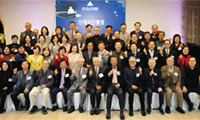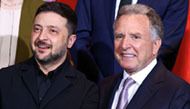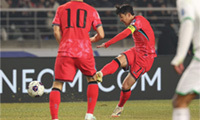YEREVAN, Armenia - Some 20,000 Armenians turned up for the opening of the Cafesjian Center for the Arts recently. They jammed the new sculpture park and the terraced gardens and galleries, including the first exhibition ever in Armenia of the Armenian-born American great, Arshile Gorky.
The center, a mad work of architectural megalomania and historical recovery, is one of the strangest but most memorable museum buildings to open in ages. Imagine an Art Deco version of the Hanging Gardens of Babylon , its decorations coded with Armenian symbolism.
Built into a gigantic hill in the commercial heart of this capital city, the place was originally conceived in Soviet times to be topped by a monument to the Soviet revolution. That it has been turned into a contemporaryart center by a rich American is a twist of history whose symbolism is lost on no one here.
There’s no endowment, no professional board, so it may very well soon fail miserably, as so much has in this country where widespread corruption, lethargy and years of isolation have led to an unemployment rate around 40 percent, a crumbling infrastructure and almost no middle class.
But for the time being, at least, it is doing what precious few museums, and even fewer vanity enterprises like it can dream of doing - namely, offering a whole nation a kind of uplift.
Young Armenians at the opening rode the center’s escalator , which rises via several grand, plaza-size landings inside to a little jazz lounge .
These days Armenian newspaper headlines dwell on the Turkish border opening, which the United States quietly presses for to gain an oil pipeline that can sidestep Russia and Iran. In return Turkey wants to table once and for all any talk about having committed genocide in the killing of more than a million Armenians nearly a century ago. Admitting to genocide has legal ramifications in terms of restitution.
Paralyzed for decades by that event and surrounded by mostly hostile neighbors, Armenia has had until now almost no place to see modern and contemporary art from outside the country. As the center’s opening proved, thousands of young Armenians are hungry for what’s beyond their borders and are open to change.
The center began during the 1930s, when a local architect, Alexander Tamanyan, conceived the Cascade, as it’s called, a towering white travertine ziggurat of artificial waterfalls and gardens tumbling down a promontory that links the historic residential and business centers of the city. The plan was largely forgotten until the late 1970s, after which construction began. Then came the earthquake in 1988 and the breakup of the Soviet Union in 1991.
Enter Gerard L. Cafesjian, the 84-year-old Brooklyn-born Armenian- American patron of the center. Armenian officials agreed he could erect a building on top of the Cascade in which to show his collection if he would complete the Cascade. What had been imagined as a $20 million undertaking soon topped $40 million, with no end in sight.
The building on top was put on hold, the focus instead turned toward completing the Cascade and the sculpture park at the foot of it.
According to Raffi Hovannisian, Armenia’s former foreign minister, the country now depends for some one-third of its economy on money sent by Armenians abroad. The global collapse has been devastating.
Even Dennis Doyle, who sits on the board of Mr. Cafesjian’s family foundation, wondered aloud about the center’s future. Mr. Cafesjian promises to pay for it. But that means it all depends on him in the end. The Armenian government is no safety net.
스마터리빙
more [ 건강]
[ 건강]이제 혈관 건강도 챙기자!
[현대해운]우리 눈에 보이지 않기 때문에 혈관 건강을 챙기는 것은 결코 쉽지 않은데요. 여러분은 혈관 건강을 유지하기 위해 어떤 노력을 하시나요?
 [ 건강]
[ 건강]내 몸이 건강해지는 과일궁합
 [ 라이프]
[ 라이프]벌레야 물럿거라! 천연 해충제 만들기
 [ 건강]
[ 건강]혈압 낮추는데 좋은 식품
[현대해운]혈관 건강은 주로 노화가 진행되면서 지켜야 할 문제라고 인식되어 왔습니다. 최근 생활 패턴과 식생활의 변화로 혈관의 노화 진행이 빨라지고
사람·사람들
more
[송년행사 화보] “이웃과 함께 나누고 지인과 함께하니 행복”
KYCC13일 윌튼 플레이스 초등학교에서 열린 ‘한인타운청소년회관(KYCC) 홀리데이 카니발’이 성황리에 막을 내렸다. 올해는 KYCC 창립 …

[송년행사 화보] “ ‘손에 손잡고’ 한 해 마무리… 건강과 행복 기원”
전주고·북중남가주 전주고·북중 총동창회(회장 백규종)의 2025년 정기총회 및 송년회가 지난 14일 LA 작가의 집에서 성황리에 열렸다. 이날…
[송년행사 화보] “한 해를 마무리하며… 화기애애…
LA 러너스클럽LA 러너스클럽(회장 김두병)은 13일 작가의 집에서 80여명의 회원과 가족이 참석한 가운데 송년회를 마쳤다. 2007년 창립된…
[송년행사 화보] “웃음과 감사 가득 ‘훈훈’… …
한국학교총연합회미주한국학교총연합회(회장 이영숙)가 주최한 제43회 장기 근속교사 포상 및 송년의 밤 행사가 140여명의 교사들이 참석한 가운데…
[송년행사 화보] “친구야 반갑다… 선배님들 모두…
경남중고경남중·고등학교 남가주 동창회(회장 예해덕)는 지난 6일 송년회를 열고 동문 및 가족 60여 명이 참석한 가운데 끈끈한 우정을 확인했다…
많이 본 기사
- 미 북서부는 홍수, 동부는 폭설 사태 비상
- LA산불 여파 ‘심각’ 지역 주민 건강악화
- 트럼프, 베네수엘라 정권 ‘테러 단체’ 지정
- ‘우크라 전쟁 피해배상’ 국제기구 만든다
- 브라운대 한인학생, 총격참사 극적 생존
- 일본도 핵잠 도입 논의 본격화? 방위장관 미 해군기지 핵잠 시찰
- 월드컵 방문객 ‘미국행’… 한국선 ESTA(전자 여행 허가서)로 입국 가능
- 크리스마스 연휴 겨울폭풍 남가주 연안 2~4인치 비
- 시드니 총기난사범, 인도 출신 이민자
- “아시안 커뮤니티는 핵심 파트너”
- “AI 활용 한국어 수업, 선택 아닌 필수”
- 중고차 주행거리 조작 ‘주의보’
- LA 소파이 스테디엄 8경기 확정
- ‘항염증 식단’ 정답은 균형… 전체적 패턴이 중요
- ‘천의 얼굴’ 루푸스… “젊은 여성, 이유 없는 발진·탈모 있으면 의심해야”
- [여명] 금붕어를 키우는 오지선다형 수능
- 치솟는 원·달러 환율… 1,480원대 찍어
- 공화당의 헬스케어 플랜
- [수잔 최 변호사의 LIFE &] AI 시대 편리함에 안주하지 말자
- [지평선] 판다 없는 일본
- 팰팍 최대규모 주상복합단지 들어서나 1
- [윌셔에서] 잠시 멈추어 서서
- 비트코인, 역대 네번째 연간 하락세
- [쿠쿠 아메리카] 빅세일 ‘CUCKOO Year-End’ 시작
- [로터리] 지멘스가 만드는 미래 동네
- 강경화 주미대사 신임장 제정 트럼프, 이 대통령 안부 물어
- 통증 양상 다른 여성 심혈관질환
- 에어 프레미아 취항, 기대 컸나
- 한국 축구, 태백산급 고지대 난관… “손흥민 감아차기도 제동”
- “연방 전기차 충전 인프라 지원 중단은 위법”
- ‘집값 폭등에 신음’ 유럽 첫 공동 대책
- 베이지역 스포츠팀, SF 한인회에 후원금
- 테슬라, 자율주행 과장광고 적발
- 워런 버핏의 투자자 위한 핵심 조언은
- 내년에 집 팔려면, 어떤 준비가 필요할까?
- 김유정, 이번엔 귀신이다.. ‘복수귀’서 박지환→조여정과 호흡
- 불자커뮤니티 20일 청소년발표회및 송년회
- VA 한인 2세, 드라마 주연 맡아
- 박찬욱 ‘어쩔수가없다’, 아카데미 예비후보
- 뱅크오브호프, 규모도 1위·봉사활동도 ‘으뜸’
- [슈올즈] “발 건강 선물하세요… 연말 감사세일”
- “신뢰감 있는 이미지”..김도훈, 광고계 러브콜 쇄도
- 뉴욕한인 팔레스타인 활동가 체포
- 자폐 어린이 돕기 ‘신년 나눔 음악회’
- 부동산 구입의 과정
- VA·MD 등 21개주, 우버 상대 소송 제기
- “100세까지 건강하게 살아요”
- 프레드 정, 시 역사상 최초 ‘4선 시장’
- 애틀랜타총영사에 이준호 공사 임명
- 뉴욕, OKC 잡은 샌안토니오 꺾고 NBA컵 첫 우승
1/5지식톡

-
 ☝️해외에서도 가능한 한국어 선생님…
0
☝️해외에서도 가능한 한국어 선생님…
0이 영상 하나면 충분합니다!♥️상담신청문의♥️☝️ 문의 폭주로 '선착순 상담'만 진행합니다.☎️ : 02-6213-9094✨카카오톡ID : @GOODEDU77 (@골뱅이 꼭 붙여주셔야합니다…
-
 테슬라 자동차 시트커버 장착
0
테슬라 자동차 시트커버 장착
0테슬라 시트커버, 사놓고 아직 못 씌우셨죠?장착이 생각보다 쉽지 않습니다.20년 경력 전문가에게 맡기세요 — 깔끔하고 딱 맞게 장착해드립니다!장착비용:앞좌석: $40뒷좌석: $60앞·뒷좌석 …
-
 식당용 부탄가스
0
식당용 부탄가스
0식당용 부탄가스 홀세일 합니다 로스앤젤레스 다운타운 픽업 가능 안녕 하세요?강아지 & 고양이 모든 애완동물 / 반려동물 식품 & 모든 애완동물/반려동물 관련 제품들 전문적으로 홀세일/취급하는 회사 입니다 100% …
-
 ACSL 국제 컴퓨터 과학 대회, …
0
ACSL 국제 컴퓨터 과학 대회, …
0웹사이트 : www.eduspot.co.kr 카카오톡 상담하기 : https://pf.kakao.com/_BEQWxb블로그 : https://blog.naver.com/eduspotmain안녕하세요, 에듀스팟입니다…
-
 바디프렌드 안마의자 창고 리퍼브 세…
0
바디프렌드 안마의자 창고 리퍼브 세…
0거의 새제품급 리퍼브 안마의자 대방출 한다고 합니다!8월 23일(토)…24일(일) 단 이틀!특가 판매가Famille: $500 ~ $1,000Falcon: $1,500 ~ $2,500픽업 & 배송직접 픽업 가능LA…
케이타운 1번가
오피니언
 수잔 최 한미가정상담소 이사장 가정법 전문 변호사
수잔 최 한미가정상담소 이사장 가정법 전문 변호사 [수잔 최 변호사의 LIFE &] AI 시대 편리함에 안주하지 말자
 김도년 성균관대 건축학과 교수 스마트도시·건축학회장
김도년 성균관대 건축학과 교수 스마트도시·건축학회장 [로터리] 지멘스가 만드는 미래 동네

[여명] 금붕어를 키우는 오지선다형 수능
 허경옥 수필가
허경옥 수필가 [윌셔에서] 잠시 멈추어 서서
 양홍주 / 한국일보 논설위원
양홍주 / 한국일보 논설위원[지평선] 판다 없는 일본

[왈가 왈부] 쿠팡 김범석 “글로벌 CEO라 불출석”… ‘맹탕’ 청문회 불보듯
 정숙희 논설위원
정숙희 논설위원칠레에서 영국까지, 27년을 걷다
 마크 A. 시쎈 / 워싱턴포스트 칼럼니스트
마크 A. 시쎈 / 워싱턴포스트 칼럼니스트 [마크 A. 시쎈 칼럼] MAGA와 ‘힘에 바탕한 외교정책’
 김동찬 시민참여센터 대표
김동찬 시민참여센터 대표 [미국은 지금] 위기의 시대, 사회안전망은 최후의 방어선이다
1/3지사별 뉴스

팰팍 최대규모 주상복합단지 들어서나
뉴저지 팰리세이즈팍 사상 최대 규모의 초고층 주상복합단지가 한인 개발업체에 의해 추진되고 있는 것으로 알려지면서 관심이 집중되고 있다. 팰팍…
연말 1억2천만명 이동

에어 프레미아 취항, 기대 컸나
에어 프레미아의 워싱턴 덜레스 국제공항과 인천국제공항간 취항이 확정된 가운데(본보 15일자 A1면), 에어 프레미아 항공권 가격이 당초 기대에…
VA·MD 등 21개주, 우버 상대 소송 제기

베이지역 스포츠팀, SF 한인회에 후원금
샌프란시스코 베이지역 한인회(회장 김한일)는 한인 메이저리거 이정후 선수의 소속팀인 샌프란시스코 자이언츠(San Francisco Giants…
불자커뮤니티 20일 청소년발표회및 송년회

오늘 하루 이 창 열지 않음 닫기 





















































.png)


댓글 안에 당신의 성숙함도 담아 주세요.
'오늘의 한마디'는 기사에 대하여 자신의 생각을 말하고 남의 생각을 들으며 서로 다양한 의견을 나누는 공간입니다. 그러나 간혹 불건전한 내용을 올리시는 분들이 계셔서 건전한 인터넷문화 정착을 위해 아래와 같은 운영원칙을 적용합니다.
자체 모니터링을 통해 아래에 해당하는 내용이 포함된 댓글이 발견되면 예고없이 삭제 조치를 하겠습니다.
불건전한 댓글을 올리거나, 이름에 비속어 및 상대방의 불쾌감을 주는 단어를 사용, 유명인 또는 특정 일반인을 사칭하는 경우 이용에 대한 차단 제재를 받을 수 있습니다. 차단될 경우, 일주일간 댓글을 달수 없게 됩니다.
명예훼손, 개인정보 유출, 욕설 등 법률에 위반되는 댓글은 관계 법령에 의거 민형사상 처벌을 받을 수 있으니 이용에 주의를 부탁드립니다.
Close
x